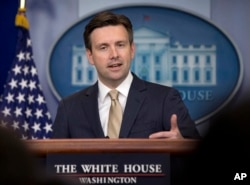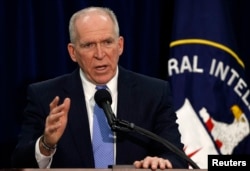Hours after the U.S. government’s domestic surveillance authority expired, senators debated a bill to restart the collection of Americans’ phone records for anti-terrorism purposes, but to have telecommunications companies store them.
“We’ll have a vote on that legislation as soon as we can,” said Republican Senate Majority Leader Mitch McConnell. “It’s time to get the job done.”
McConnell pressed for an expedited vote on the USA Freedom Act Monday, but was blocked by a fellow Republican, Senator Rand Paul, who objected. As a result, the majority leader scheduled a vote to end debate for later Tuesday.
Until and unless both houses of Congress pass an identical bill authorizing the bulk collection of telephone data by some entity, those logs will not automatically be kept.
Passed overwhelmingly last month by the House of Representatives, the USA Freedom Act would keep phone records in private corporate servers unless the government obtains a court order to review them.
After initially rejecting the bill, the Senate voted late Sunday to begin floor deliberations and consider possible amendments. The vote came hours before the NSA’s authorization to collect bulk data expired, with no program approved to replace it.
Despite acknowledging a need for swift action, the Senate’s Republican leadership wants to amend the USA Freedom Act to allow more transition time for the new data collection program to be launched, and wants the Director of National Intelligence to certify that the system is working.
“These fixes are common sense, and whatever one thinks of the proposed new system, there needs to be basic assurance that it will function as its proponents say that it will,” said McConnell. “The Senate should adopt these basic safeguards.”
Any alterations would force another House vote before the bill could go to the White House for President Barack Obama’s signature
While Congress works its will, the U.S. government will have to subpoena phone companies for call records if a terrorist plot is suspected, rather than simply consulting the National Security Agency’s databases.
The situation has the White House expressing increasing impatience with Congress in general and the Senate in particular.
“The Senate’s failure to act introduces unnecessary risk to the country and to our citizens,” said White House spokesman Josh Earnest.
On Monday, multiple senators took to the floor to defend the bulk collection of Americans’ telephone records, a program exposed two years ago by fugitive former NSA contractor Edward Snowden.
“I think the American people want us to know if terrorists are talking to somebody in this country,” said Republican Richard Burr, chairman of the Senate Intelligence Committee. “I think they really do want us to know that.”
Another Republican, John Cornyn, warned that the United States is slipping back into a “pre-9/11 mentality” – referring to the federal government’s failure to detect terrorist threats prior to the attacks of September 11, 2001.
Democrats, meanwhile, are voicing strong support for the USA Freedom Act and urging its prompt approval.
“We need to get these [data collection] authorities restored,” said Senator Barbara Mikulski. “Do we need reform? Absolutely. But let’s not delay, let’s get it going.”
Rand Paul’s procedural delaying tactics have earned him the ire of some colleagues on Capitol Hill. But the senator, who is running for the Republican presidential nomination next year, is standing firm in his contention that bulk telephone data storage at the government’s behest is an unconstitutional violation of Americans’ civil liberties.
Speaking late Sunday, Paul warned against allowing government agencies to “collect anything they want anytime they want.”
WATCH: Related video clip


